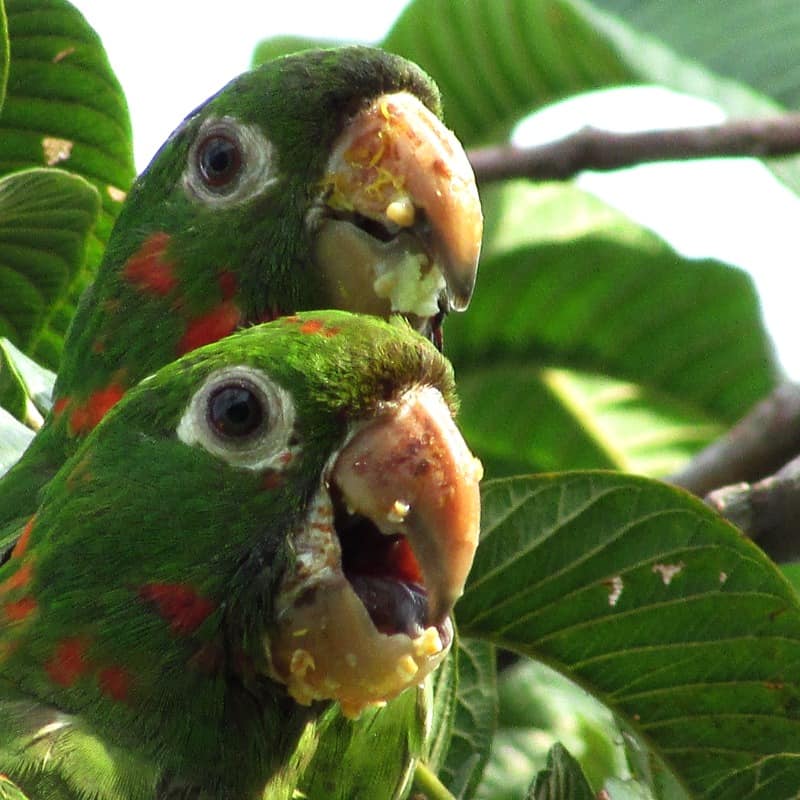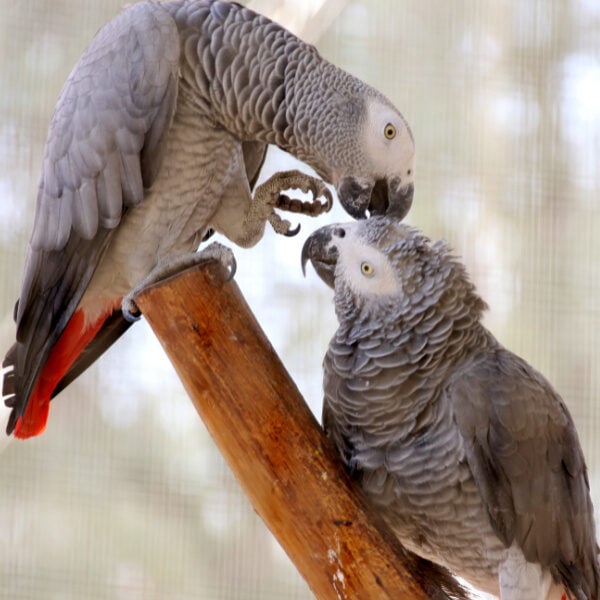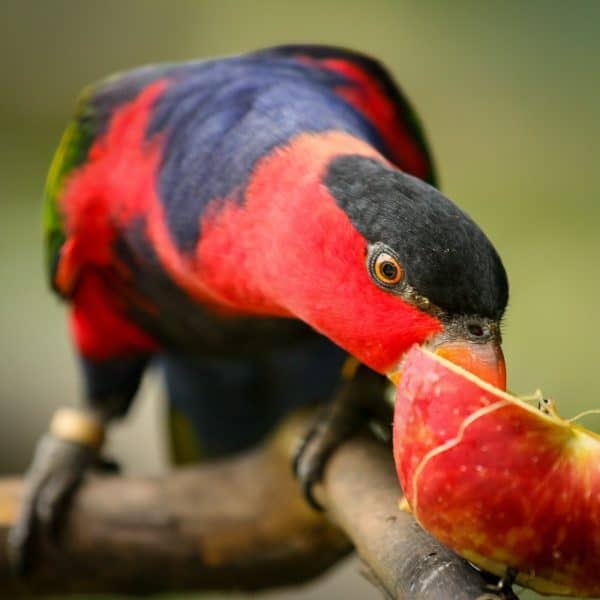Last Updated on by Mitch Rezman
Are you a proud pet bird owner?
If so, you know that feeding your feathered friend the right food is essential for their health and happiness.
But with all the different types of bird food out there, it can be difficult to decide what’s best for your pet.
In this blog article, we’ll explore how to feed your pet bird properly and provide some tips on choosing the right foods.
Read on to learn more about keeping your beloved companion healthy and well-fed!
Having a pet bird is an exciting and rewarding experience. But, like any other pet, it needs to be fed properly in order to stay healthy and happy. So how do you feed your feathered friend? Here are some tips on how to provide the best nutrition for your pet bird!
First off, make sure that you’re providing a balanced diet for your bird.
This means offering them both seeds and pellets as well as fresh fruits and vegetables. Seeds should make up about 30% of their diet while pellets should account for the remaining 70%.
It’s important to note that pet bird food brands like Higgins (all brands) and Hagen Tropimix blend pellets in with seeds fruits and nuts.
Fruits and veggies can also be offered daily but in moderation, since fruits contain more sugar than is necessary for birds’ diets.
It’s important to choose high-quality commercial bird food when feeding your pet bird – look out for brands that have been specifically formulated with avian nutrition in mind!
Also, try to avoid seed mixes with added colors or flavors; these can contain unhealthy ingredients that could harm your feathered friend over time.
When it comes time to serve meals, always offer clean dishes so there’s no risk of contamination from bacteria or mold spores which can cause illness in birds if ingested regularly over long periods of time.
It’s also important not to leave food like fresh veggies, out all day because this encourages spoilage which may lead to digestive issues down the line.
Our birds get food topped off or replaced around 4:00 daily when the shop closes.
We empty their Tweeky Clean Feeders into a blue glass plate placed at the bottom of the cage.
The Tweeky Cleans are effective but budgies are ground feeders so we respect their intuitive motivations.
Finally, remember that variety is key when it comes to feeding pets – just like humans, birds need different types of nutrients from different sources so mix up their diet every now and again!
Offer them new foods such as cooked egg yolk (boiled or scrambled), cooked beans (without salt), nuts (unsalted), etc., once a week or fortnightly depending on what works best with their routine!
Our birds usually get a punch of what was on our dinner plates, especially pasta noodles.
By following these simple steps you’ll ensure proper nutrition for your beloved companion while keeping them healthy & happy!
If you’re considering getting a pet bird, it’s important to know what they eat. After all, providing your feathered friend with the right nutrition is key to keeping them healthy and happy!
The good news is that there are plenty of options when it comes to feeding pet birds.
Most species will enjoy a combination of fresh fruits and vegetables, seeds, nuts, grains, and legumes. It’s also important to provide vitamin-enriched pellets or crumbles as part of their diet – these should make up about 70% of their daily food intake.
Fruits such as apples (minus the core), oranges (without the peel), and bananas are great for adding variety to your bird’s diet – just be sure not to give too much fruit as this can cause digestive issues in some species.
Vegetables like carrots (shredded or grated), celery stalks (cut into small pieces) and cooked sweet potatoes are also popular choices amongst our feathered friends!
Seeds can be an excellent source of protein for birds but should only make up around 10-15% of their total dietary intake due to their high-fat content – sunflower seeds being one exception which have lower levels than other varieties so can be given more often in moderation!
Nuts like almonds or walnuts provide essential fatty acids while grains such as oats offer carbohydrates; both should also only be offered sparingly due to potential health risks associated with overfeeding these items.
Legumes like beans contain lots of vitamins A & C plus iron so they’re another great addition if you want your birdie to feel fit and full of life!
Finally don’t forget water – fresh clean drinking water must always be available for your pet bird at all times; this helps keep them hydrated throughout the day which is especially important during hot weather months when dehydration becomes more likely if not monitored closely enough by owners/carers alike…
All our birds get Lafebers vitamins dissolved in their water.
All in all, there’s no shortage of what you can feed a pet bird but remember that each species has its own specific dietary requirements so do research beforehand before deciding on any particular type(s)of food item(s).
With proper care from owners/carers combined with adequate nutrition provided through balanced diets tailored towards individual needs, we guarantee that any feathery family member will live long lives filled with joyous chirps n’ tweets galore!!
Written by Mitch Rezman
Approved by Catherine Tobsing
Mary L writes
I have tried feeding the most popular pellets for over 20 years. without success.
I now feed a diet that has some pellets but mostly seeds.
My 5 – 2 Congos, a Timneh, a Quaker & tiel are in good health.
I offer fresh veggies, fruits, pasta, crackers etc. I believe that birds should live in a flock where they learn from each other – what foods to try and watch other members eat.
A single bird is needy & it is unfair to keep one unless you can spend the majority of your day with that bird.
Birds need a flock whether with other birds or you should be prepared to be their flock & be with them most of the day.
Thank you for the feedback Mary,
“The best pellet for your bird is the pellet your bird will eat,” Catherine, my wife and business partner.
The flock thing is really more critical than people realize.
We’re fortunate to work out of “Flex Space” where we reside and work.
All the birds enjoy human interaction and each other’s interaction throughout the day which makes for birds with a healthy mentality as damaged as they all are.
We have 11 in our flock and have been struck in awe by the whole “birdie see, birdie do” evolution.
All of them are rescues with opaque pasts so what they see is “new” for them.
Yes, a single bird is sad unless they have a doting human.
The flip side to that is we’ve seen humans get a second bird and are surprised to learn that “two companies threes a crowd” can morph the dynamic quicker than they’d expect, not in their favor.
Best
MitchR
It looks like Mitch did reply to you and has corrected the article.
Oh yes, we find the birds do help each other to consider new foods. One eats, they all want to check it out. Our birds get a fresh breakfast of chopped kale, corn, beans, carrots, apples, and grapes daily.
The parakeets started out being afraid, but now they dive in and eat as soon as the dishes appear.
If we can help further, please let us know.
Catherine
.
Author Profile
Latest entries
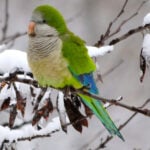 The Traveling BirdJune 26, 2025Can You Name 5 Parrot Species That Are Living Wild in the USA?
The Traveling BirdJune 26, 2025Can You Name 5 Parrot Species That Are Living Wild in the USA?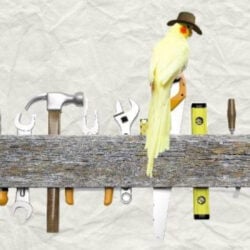 Bird BehaviorJune 26, 2025How is it Parrots Are Problem Solvers Social Animals and Even Use Tools?
Bird BehaviorJune 26, 2025How is it Parrots Are Problem Solvers Social Animals and Even Use Tools?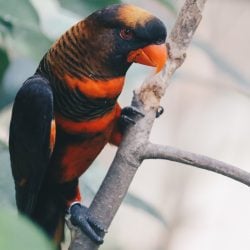 Bird & Parrot AnatomyJune 25, 2025How a Tiny Chemical Modification Makes Parrots Nature’s Living Paintings
Bird & Parrot AnatomyJune 25, 2025How a Tiny Chemical Modification Makes Parrots Nature’s Living Paintings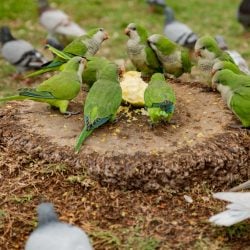 PigeonsJune 20, 2025How Do Parrots Thrive in Cities Outside Their Native Habitats?
PigeonsJune 20, 2025How Do Parrots Thrive in Cities Outside Their Native Habitats?
